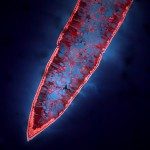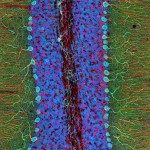Link to Pubmed [PMID] – 17028573
EMBO Rep. 2006 Nov;7(11):1147-53
Deltex (DTX) and AIP4 are the human orthologues of the Drosophila deltex and Suppressor of deltex, which have been genetically described as being antagonistically involved in the Notch signalling pathway. Both genes encode E3 ubiquitin ligases of the RING (Really interesting new gene)-H2 and HECT (Homologous to E6AP carboxyl terminus) families, respectively. In an attempt to understand the molecular basis of their genetic interactions, we studied the relationship between DTX and AIP4 in the absence of activation of the Notch pathway. We show here that both molecules interact and partially colocalize to endocytic vesicles, and that AIP4 targets DTX for lysosomal degradation. Furthermore, AIP4-generated polyubiquitin chains are mainly conjugated through lysine 29 of ubiquitin in vivo, indicating a link between this type of chain and lysosomal degradation.


